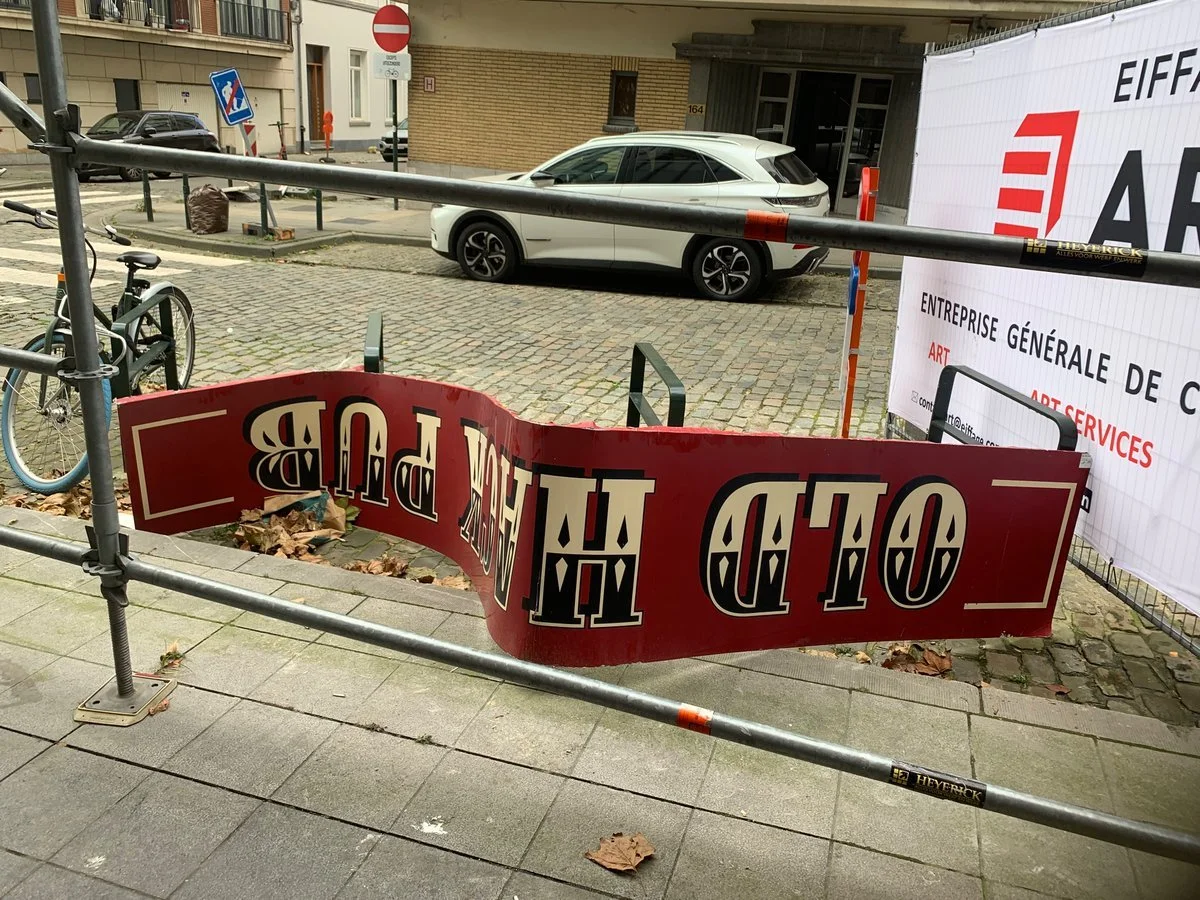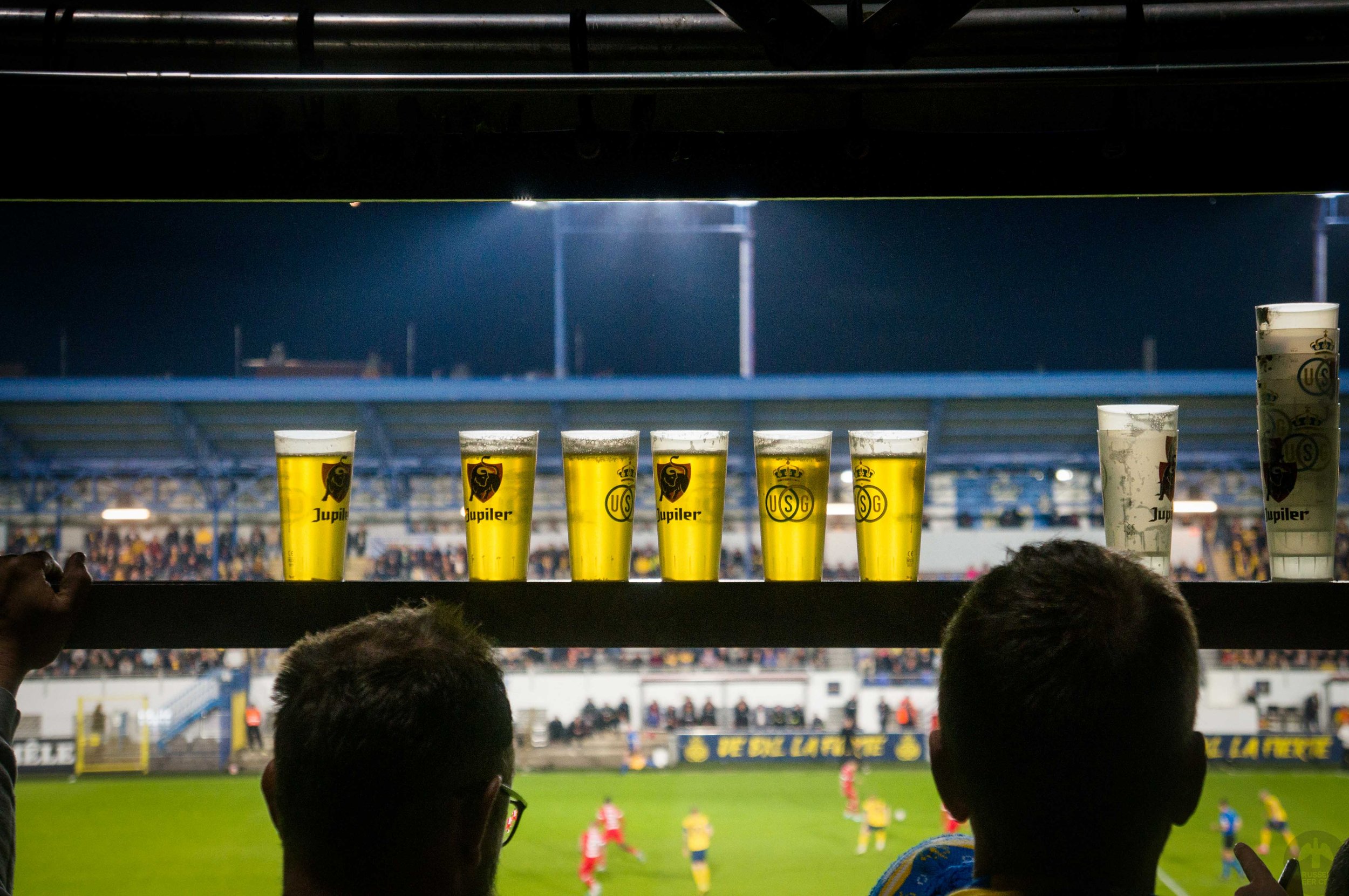Brussels Irish // The James Joyce: last call for the Irish pub?
Brussels Irish is a short, personal series of reflections and profiles about being an Irish man drinking beer in Brussels. This is the third and final article in the series; you can read the first and second here.
The green-and-gold door looks closed, but a tug on the brass lion doorknob and it pulls open. Inside, the lights are off in the back and there is no evidence of any customers or staff. It’s Saturday evening just past seven and the James Joyce, Brussels’ oldest Irish bar, is quiet. Almost thirty years after it opened, is Brussels’ oldest Irish bar on the way out?
Eventually, a hacking cough reveals the presence of a barman, who emerges from the gloaming in a fug of cleaning fumes. He confirms that, yes, the bar is open but most of the staff are off celebrating a birthday, and he pours me a Maes in a ribbekes glass. To the gurgle and clink of him setting the bar up for the evening, I sit down on an arse-worn banquette and get my bearings.
In the shadow of the European Union
You can find the James Joyce on Rue Archimède in the shadow of the European Commission’s headquarters. Donegal man Brian O’Donnell opened the pub in an old Pakistani restaurant in 1989, 16 years after Ireland joined the European Economic Community. It was not until the mid-1990s before the Irish pub craze really took hold in Brussels (Boak and Bailey’s 20th Century Pub is a great place to learn about the Irish Pub Company, the group largely responsible for the worldwide spread of the “Irish Pub”). O’Donnell eschewed “Irish Lego” pub templates, preferring to cobble it together as a “real Irish bar”.
“...they garner the succulent berries of the hop and mass and sift and bruise and brew them and they mix therewith sour juices and bring the must to the sacred fire and cease not night or day from their toil, those cunning brothers, lords of the vat”
Nora Barnacle and the Green Bay Packers
The Joyce today looks about as “real” as it ever did – an Irish country pub transported to the centre of Brussels’ European quarter. The bar is a narrow room stretching away from the street and disturbed only by a lone pillar in the centre of the room. The walls are off-white and there is an abundance of dark-stained wood on the bar and on the ceiling.
Chalk drawings of Joyce and his wife Nora Barnacle hang on the wall, alongside Guinness toucans and whiskey ephemera from Jameson and Famous Grouse. The cod-Irishness is sometimes disrupted. There is a Green Bay Packers banner hanging from the ceiling, and tatty St. George’s Cross bunting hangs alongside adverts for rugby. There is a fish tank, with two live goldfish, behind the taps.
The barman is finished pootling around, and my glass is empty, along with the bar. I feel honour-bound to have another, if only to justify my interloping. A pint of Guinness, please. I remember coming here once before, soon after I arrived in the city; a friend who worked at a nearby Irish pub – there are seven(ish) in this neighbourhood – would come here after work or a session for a sausage sandwich. Otherwise, I have avoided Irish bars for the same reasons I have avoided Guinness.
Drinking Chinggis at the Grand Khaan
Sure, I have watched Ireland beat England in Twickenham on St. Patrick’s weekend in Flaherty’s of Barcelona. I have slurped down pints of Czech pilsner in The Crack (sic) on Erasmus study in Olomouc. I have even drunk Chinggis beer in Ulaanbaatar’s Grand Khaan. But now, Irish pubs and their ersatz nostalgia hold no draw for me; my connection to Ireland, always weak, is now more or less gone. I’m happy to leave Irish pubs to Brussels’ new Irish arrivals. To the tourists. And to the English expats, like the group that has just barrelled through the doors of the Joyce.
They take up residence at the far end of the bar and tell tales of mini golf triumphs an birthday celebrations as the barman pours their drinks. A man swaggers in with a half-drunk pint of Guinness – origin unknown – with the confidence of a man who either works here or lives here. Or both. Another, older, English man follows them in shortly after but sits alone. "Pint of Guinness?” “Please.”
“Brewery barge with export stout. England. Sea air sours it, I heard. Be interesting some day get a pass through Hancock to see the brewery. Regular world in itself. Vats of porter, wonderful. Rats get in too. Drink themselves bloated as big as a collie floating. Dead drunk on the porter. Drink till they puke again like christians. Imagine drinking that!”
English exiles in Irish pubs
England is a much the spiritual home of the Irish pub as Ireland; it is where the concept took off and spread to the rest of the world. English expats have always been central to the survival of the James Joyce and, Brexit aside, that does not look like changing on tonight’s evidence. For them, and other expats, the Irish pub is a comfortingly familiar reminder not only of Ireland but also of their own hometowns - which are sure to have at least one. Add to them the ever-churning population of Irish graduates fresh off the plane and still umbilically connected to the pint, the pack of Taytos, and the cup of Barry’s Tea.
The James Joyce will probably be fine, even if this Saturday night looks to be a bust. After all, Saturday nights are not really prime drinking time in this part of Brussels.
The soundtrack behind the bar has swerved from non-more-Celtic Tiger band Republic of Loose towards "80s bangers". The crowd at the end of the bar looks like they are hunkering down for the night. I leave them to it. The barman has enough company now not to notice me slipping back out the green-and-gold door. Back home to Brussels.













